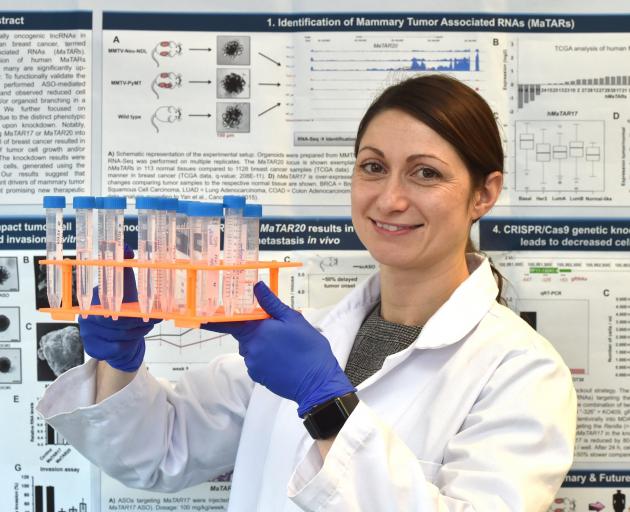
Dunedin-based Amaroq Therapeutics, which is focused on developing new cancer treatment drugs, has teamed up with Auckland startup GeneCrypt, which uses privacy preserving technology to unlock value in genetic data.
It is believed to be the first time an oncology biotech company in New Zealand had used end-to-end secure genomic data management for its cancer drug discovery pipeline.
Amaroq was founded by Dr Sarah Diermeier, an Otago-based biochemist who has been working on developing a new class of therapeutics that target long non-coding RNA in cancer.
The company was set up through Otago Innovation to commercialise its work. To date, Amaroq has received $14 million in investment led by the life science investor Brandon BioCatalyst along with Otago Innovation Ltd, NZ Innovation Booster and Cure Kids Ventures.
Cyber-attacks and data breaches were a rising threat in healthcare worldwide. New Zealand had experienced several high-profile health data breaches in the past year and hundreds of thousands of patients were potentially exposed, Dr Diermeier said.
"This partnership will mean we can harness the power of data and extract valuable insights that will aid us in developing critical new drugs and improving patients' lives — and we can be 100% certain that all sensitive information will remain secure throughout the entire process, ensuring the protection of our patients' privacy and data," she said.
It was extremely important to Amaroq to protect patients’ health data. The research was very sensitive as it contained the genomic information of patients which might predict potential future health issues and expose genetic information shared with family members.
The collaboration with GeneCrypt would allow Amaroq to "supercharge" its existing research pipeline by accessing more patient data sets. That would expand Amaroq’s opportunities for drug discovery and business development.
Dr Diermeier, whose drive to help find a cure for cancer was driven by her first experience with cancer when, as a 12-year-old, she watched her godmother die from the disease.
Treatment was "unbelievably cruel" and often did not help, she said.
She wanted to put her anger to good use and, because there was no internet back then — "I couldn’t google what to do" — she went to the school library to read up on what she would need to do.
Her goal was to make treatments that helped survival and also significantly improved patients’ wellbeing, rather than making them so sick.
German-born, Dr Diermeier trained in cancer biology and drug development in the United States. Delightfully engaging, she acknowledged it was a tough goal, and an ambitious one.
"[But] you’ve got to have ambition," she said.
New Zealanders were often very humble and tended to focus on New Zealand-centric research. But that did not mean they could not have more ambition.
"This is a really big goal ... what’s the worst that can happen? I can fail. [But] we will have gotten somewhere in the journey."
Amaroq had three executives — Dr Diermeier and two based in Australia, so much business was conducted over Zoom.
One of the positive aspects to come from the Covid pandemic had been the widespread adoption of such technology, she said.
Also the RNA-based Covid vaccines meant increased awareness which was also in her favour, so it was definitely a matter of being the right time and right place, she said.
The funding process had begun just before the pandemic and had started to get traction, but the awareness around RNA definitely helped with visibility.
When that investment was raised, no-one else in the world was doing what Amaroq was doing. Now there were a handful but in big biotech hubs, she said.
If things went to plan, Dr Diermeier hoped the first clinical trials could begin in 2025. It had two programmes, one for bowel cancer and the other for a very aggressive form of breast cancer and, within the next six months, it would be decided which would hit the trials first. Brain cancer was next in the pipeline.
She hoped to run those trials in New Zealand, which was a good place for running clinical trials. All the research so far had happened in New Zealand and had been funded by New Zealand and Australian funders.
It would be an opportunity to "give back" to the community so New Zealand patients had the first access in the world to new drugs.
The introduction to GeneCrypt was "serendipity"; both she and its founder Kris Vette were doing an online course for entrepreneurs through Stanford University on how to go from idea to impact. The pair ended up chatting during some networking sessions.
While there was much more awareness around genomic data security, it was something she believed all companies should be doing to protect their patients.
Mr Vette said GeneCrypt was honoured to be working with Amaroq, as Dr Diermeier and her team were at the leading edge of RNZ cancer research internationally.
New Zealand insurance companies were permitted to ask for the results of genetic tests, which had the potential for discrimination and higher costs of coverage for people who were at risk of genetic conditions.
"An insurance company can ask for the results if you have been genetically tested. With GeneCrypt, patient data is anonymised and analysed by gene region to prevent any reidentification risk with sensitive data. This offers a new level of protection for data subjects in the research setting," he said.












